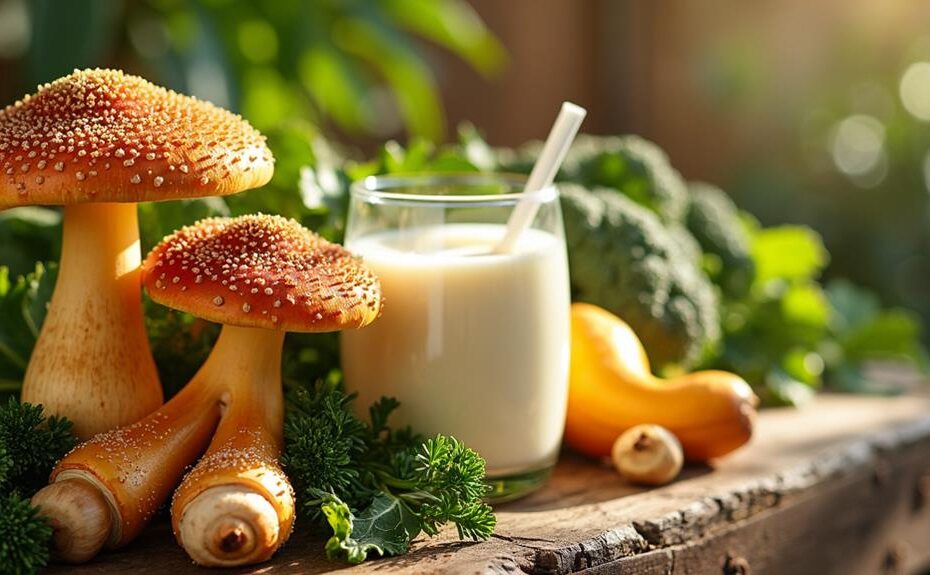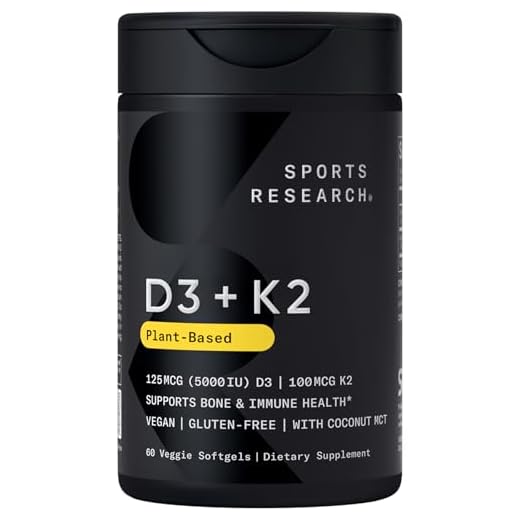







As a vegan, your best natural sources of vitamin D include UV-exposed mushrooms, fortified foods, and sunlight. Mushrooms can provide around 450 IU of vitamin D per 100 grams. Look for fortified plant-based milks, cereals, and nutritional yeast, which add about 100 IU per serving. Sun exposure is also essential; just 5 to 30 minutes twice a week can help your body synthesize vitamin D. If you're not getting enough from food and sun, consider vegan supplements. Staying informed about these sources can greatly support your health. You might find even more helpful insights as you explore further.
Key Takeaways
- UV-exposed mushrooms can provide about 450 IU of vitamin D per 100 g serving, making them an excellent source for vegans.
- Fortified plant-based milks, cereals, and nutritional yeast can offer between 100 to 140 IU of vitamin D per serving.
- Certain brands of fortified tofu can contain around 120 IU of vitamin D per one-fifth block, contributing to vegan diets.
- Regular sun exposure of 5 to 30 minutes twice weekly can help produce sufficient vitamin D naturally.
- Vitamin D supplements, particularly vegan D3 from lichen, are recommended for those with limited dietary sources or sun exposure.
Importance of Vitamin D
Vitamin D is essential for your overall health, and it regularly plays an important role in regulating calcium and phosphorus levels in your body. This regulation is critical for maintaining strong bones and teeth. Without adequate vitamin D, you risk developing bone health issues, which can lead to conditions like osteoporosis. Furthermore, vitamin D supports your immune system, helping to fend off infections, particularly respiratory illnesses. Insufficient levels of vitamin D can also contribute to muscle weakness and increased risk of falls in older adults, highlighting its significance in overall physiological balance and health maintenance.
Vitamin D deficiency affects about 1 billion people worldwide, making it essential to monitor your vitamin D intake. If you're following a vegan diet, getting sufficient vitamin D can be challenging since sunlight is the primary natural source. However, you can still meet your needs through fortified foods and UV-exposed mushrooms, which can provide a significant boost. Understanding vitamin D's importance is essential for maintaining healthy calcium levels and supporting overall well-being. While research continues to explore the additional benefits of vitamin D, including its potential role in reducing the risk of chronic diseases, it's clear that ensuring adequate levels is critical for your immune function and bone health. Prioritize your vitamin D intake to safeguard your health, especially if you're not getting enough sunlight.
Risks of Vitamin D Deficiency
Living without adequate vitamin D can lead to a host of health risks that often go unnoticed until they become severe. Vitamin D deficiency affects approximately 1 billion people worldwide, with around 42% of adults in the U.S. lacking sufficient vitamin D levels. This deficiency increases your risk for weak bones and immune dysfunction, which can have serious implications for your overall health. Furthermore, vitamin D plays an essential role in regulating immune responses and antimicrobial peptide production, making it vital for maintaining a balanced immune system essential for immune modulation.
Low vitamin D levels can manifest as fatigue, bone pain, and muscle weakness, making daily activities challenging. Additionally, mood changes, including depression, can arise, impacting your mental health. High-risk groups, such as the elderly and people with darker skin, often struggle to produce adequate vitamin D due to limited sun exposure.
To combat these risks, regular screening for vitamin D levels is essential, especially for those in high-risk categories. By taking proactive measures, you can help prevent the health issues linked to being deficient in vitamin D. Staying informed about your vitamin D status can empower you to make lifestyle changes that support your well-being and protect against the potential consequences of deficiency.
Natural Vegan Sources
For those following a vegan diet, finding natural sources of vitamin D can be a challenge, but there are several excellent options available. One of the best sources is UV-exposed mushrooms, which can provide about 450 IU of vitamin D per 100 g serving. Incorporating these mushrooms into your meals can greatly boost your vitamin D content. Additionally, certain mushrooms, like shiitake and maitake, are known to synthesize vitamin D when exposed to sunlight, further enhancing their nutritional profile mushrooms as a plant-based source.
Additionally, fortified plant-based milks, like soy and almond milk, typically contain vitamin D2, offering around 100-120 IU per cup. Fortified cereals can also be a valuable addition to your breakfast, with some brands providing up to 100 IU per serving.
Another great vegan source is fortified nutritional yeast, which is often enriched with vitamin D and can easily be sprinkled on various dishes for added flavor. You might also consider fortified orange juice, available from some brands, which can contribute up to 140 IU per serving to your daily vitamin D intake. By including these natural vegan sources of vitamin D in your diet, you can help guarantee you're meeting the recommended levels for ideal health.
Fortified Foods Options
If you're looking to boost your vitamin D intake, fortified foods offer a convenient solution for vegans. Many fortified plant-based milks, like soy and almond milk, provide about 100-120 IU of vitamin D per cup. This makes them an easy addition to your daily diet. Additionally, fortified breakfast cereals typically deliver between 8 to 100 IU per serving, helping you enhance your vitamin D intake with your morning meal.
Fortified orange juice is another tasty option, with some brands containing up to 140 IU of vitamin D per serving. You might also want to take into account fortified nutritional yeast, which is often enriched with vitamin D; just be sure to check the label for specific amounts, as they can vary by brand.
Certain brands of fortified tofu can also contribute considerably to your dietary vitamin D, offering around 120 IU per one-fifth block. Incorporating these fortified foods into your meals can help guarantee you're getting adequate vegan sources of vitamin D. By keeping an eye on the IU of vitamin D in these options, you can effectively support your overall health and well-being.
Benefits of Sun Exposure
Getting enough sun exposure is essential for maintaining healthy vitamin D levels, especially for those following a vegan diet. Your body can produce sufficient amounts of vitamin D when you expose your skin to sunlight for just 5 to 30 minutes twice weekly, depending on your skin type and the UV index. The synthesis of vitamin D occurs most effectively between 11 am and 3 pm, particularly during spring and summer when the sun's rays are strongest. Vitamin D deficiency causes can include insufficient sunlight exposure and poor dietary intake, which are especially relevant for vegans who may not get enough vitamin D from food sources.
Be mindful that individuals with darker skin may need longer sun exposure to generate the same vitamin D levels as those with lighter skin due to higher melanin levels, which can inhibit vitamin D synthesis. Additionally, your geographic location plays a role; if you live at higher latitudes or in urban areas with high pollution, you might experience reduced sunlight exposure. Seasonal changes also affect vitamin D synthesis, with many people facing deficiencies during the autumn and winter months when sunlight is limited. To maintain ideal vitamin D levels, try to get regular sun exposure, keeping your skin exposed when the conditions are right.
Vitamin D Supplements
Finding the right vitamin D supplements can be vital for vegans aiming to maintain healthy levels, especially when sunlight exposure is limited. You'll want to take into account supplements that contain either D2 (ergocalciferol) derived from yeast or fungi, or vegan D3 (cholecalciferol) sourced from lichen. Both options provide suitable choices for those on a plant-based diet.
Brands like Doctors Best Vegan D3 and Country Life Vegan D3 offer high-quality options that can help you meet the recommended daily intake of around 800 IU, particularly during months with limited sun exposure. To enhance absorption, it's advisable to take your vitamin D supplements with high-fat meals; studies indicate a 32% increase in vitamin D levels when consumed in this manner.
Additionally, you might find that some plant-based milks are fortified with vitamins, including vitamin D, which can complement your supplement intake. However, regular monitoring of your vitamin D levels through blood tests is important. This practice helps you avoid potential toxicity and guarantees you're getting enough vitamin D to support your overall health.
Recommended Daily Intake
Understanding the recommended daily intake of vitamin D is vital for maintaining ideal health, especially for those following a vegan lifestyle. For adults, the intake is typically set between 600 to 800 IU, with 800 IU recommended for vegans who might have limited dietary sources. Infants up to one year should receive 400 IU daily, while children aged one and older need 600 IU to guarantee adequate growth and development.
Pregnant and breastfeeding women should also consider vitamin D supplementation, around 600 IU daily, to support their health and that of their baby. It's important for you to monitor your vitamin D levels, particularly if you have limited sun exposure, as this can lead to deficiency. A deficiency in vitamin D can have serious health implications, including weakened bones and impaired immune function.
Monitoring Vitamin D Levels
Monitoring your vitamin D levels is essential, especially if you're following a vegan diet. Regular evaluation guarantees you're meeting your nutritional needs and helps you avoid deficiency. While the recommended daily intake for adults is 600-800 IU, individual requirements can vary, making it important to keep track of your levels.
At-home testing kits are a convenient option for measuring vitamin D levels without frequent trips to your healthcare provider. However, routine blood work is still recommended for at-risk populations, including vegans, to detect any deficiencies early. This proactive approach allows you to adjust your dietary sources or supplementation accordingly.
Consult with your healthcare provider to develop a personalized monitoring plan, especially if you have limited sun exposure or rely heavily on non-traditional dietary sources of vitamin D. Regular monitoring not only helps maintain adequate levels but also prevents the risk of toxicity from excessive supplementation. By staying informed about your vitamin D levels, you can better support your health and well-being on a vegan diet.
Conclusion
Incorporating natural sources of vitamin D into your vegan diet is essential for maintaining ideal health. Whether you're soaking up the sun or enjoying fortified foods, there are options available that can meet your needs. Just like how our ancestors thrived on seasonal diets, you can guarantee your body gets the nutrients it craves. Don't forget to monitor your vitamin D levels and consider supplements if necessary. Your health deserves the same attention as a well-tended garden!







